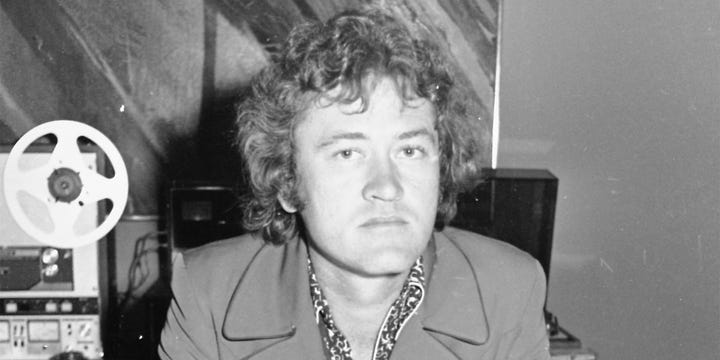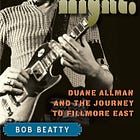Play All Night Playlist Project #15: Atlantic Records
Accompanies Chapter 11: Phil Walden and Capricorn Records
Welcome to Long Live the ABB: Conversation from the Crossroads of Southern music, history, and culture.
Before I get rolling, I want to say thank you to each of you for reading Long Live the ABB. I genuinely had no expectations when I published Play All Night and launched @LongLivetheABB on social media in 2022 and/or started this newsletter this past April. There are now tens of thousands of people across the various channels following my musings.
And that’s pretty damn cool.
Play All Night Playlist Project #15: Chapter 11
Chapter 11 of Play All Night! highlights southern music empresario Phil Walden, whose love of and support for the Allman Brothers Band was vital in their founding era.1
Here’s Playlist Project #1-14
Phil Walden
In early 1969 and with help from Jerry Wexler of Atlantic Records, Walden purchased Duane Allman’s contract from Rick Hall at FAME Studios in Muscle Shoals.2
Walden had managed Otis Redding until Redding’s untimely death in December 1967. He and Wexler were familiar—Redding was signed to Memphis’s Stax Records, an Atlantic subsidiary.
In addition to managing Duane and the Allman Brothers Band, Wexler convinced Walden to found a record label, which they named Capricorn Records for their shared astrological sign.3 One of Walden’s earliest, and best moves was hiring Frank Fenter, a South African native who had signed both Cream and Led Zeppelin to Atlantic. Together, Walden and Fenter built an empire of Southern music in Macon.
Said Atlantic founder Ahmet Ertegun, “Phil was the one who had the relationship with the artists, and Frank was the one who knew the day-to-day business. Whatever success they gained, they gained because of the efforts that each put in.”=
Capricorn Records
Like Duane’s insistence on artistic independence for the Allman Brothers Band, Capricorn’s independence from Atlantic was equally important. Capricorn would do more than produce and sell records. “You can be a record label and produce one type of music,” said Fenter, “but you can’t be a record company. We’ve always anticipated being a thoroughly involved company.” Their model included business subsidiaries, all operating under the Capricorn banner: label, artist management, booking agency, music publishing, and later, merchandise.
While all was calm on the surface, obvious conflicts of interest arose. Wexler was an Atlantic executive and co-owner of its Capricorn subsidiary. Walden was the ABB’s manager, co-owned its label, and controlled publishing and booking. Wexler might make decisions that were best for Atlantic but not for Capricorn; Walden could choose something that was best for Capricorn but not the ABB.
The relationship held together until 1972, when Walden and Wexler parted acrimoniously after Walden exercised an option to move Capricorn from Atlantic to Warner Brothers.4 (And though Dickey was the first to sue Capricorn/Walden for mismanagement in the mid-70s, Berry Oakley had been concerned about the band’s finances as early as 1971/2.)
But that was a few years into the future.
In the early era, Duane recognized how important the label was to his career. “Getting with Atlantic” (and not “Hey Jude”), he said, was his first major break in the music industry. “They dig our music, man,” Duane said. Wexler was “the solidest cat with the clearest eye,” who left the creative decisions up to artists. “And Ahmet, the president, he loves to listen to good sides.”
Most importantly, Duane felt Ertegun and Wexler saw more than money in music. “Want to play music? They’ll make sure people hear your music.” It was a refreshing attitude after Duane’s experience with Liberty Records.
He expressed his gratitude in a postcard to Wexler in January 1970:
“Thanks for your help, guidance, confidence but most of all your friendship. Love to you and yours always.”
“I mortgaged everything for this thing. I believed in it that much.” Phil Walden
I pulled this quote from a documentary that ran on CMT in the mid 2000s. Because no matter what happened later business-wise (and a lot happened), Phil Walden was as important to the success of At Fillmore East as any nonmusician involved in the project. The album was payoff for his belief in and support of Duane’s artistic vision from the very beginning.
Walden built Capricorn Records around Duane and most importantly, fought Wexler’s efforts to move the ABB from the South to break them nationally. Duane and the group wanted to remain in the South in order to do their best work, and Walden supported Duane’s vision.
The economics of artist development didn’t work in Walden’s favor.
As Capricorn’s Bunky Odum explained, “We had a lot of money sunk into the band. When you’re in the management business, you’re in it to develop, and that’s what we were doing. When you have a band making $1,000 to $2,000 a night, you can’t reach out and take a 15 percent commission, but you can put it on the books and that’s what we did. A lot of the money invested was just keeping them alive and on the road. In the course of a year, $100 here and $300 there adds up.”


Walden continually fought Wexler’s attempts to move the band to more music business–friendly environs.
“We didn’t want to leave our roots and where we felt comfortable,” Betts said. “We fought tooth and nail to prevent Atlantic from moving us out of the South, when they said we’d never make it living in Macon, Georgia, and playing our type of music. They insisted we should go to New York or L.A. and they’d break us out of there.” Betts said, “Thank God we, along with Phil Walden were smart enough to know that that would ruin the band.”
The Playlists
Much of Chapter 11 surrounds the business of rhythm & blues and soul music—particularly Stax and Atlantic Records—which is why I feature them prominently here. It’s also the catalog I know the best.
This is another far-from-comprehensive list, just some tracks I picked out as I thought about this chapter.
I’ve divvied up the songs into two, hour-long playlists, an overview of Atlantic and Stax’s rhythm and blues hits and a separate hour-long set of Otis Redding cuts.
I could’ve sliced this any number of ways, and your mileage may vary.
Spotify playlists
Youtube playlist
Liner Notes
While playlists are free for all, liner notes are reserved for paid subscribers.
Keep reading with a 7-day free trial
Subscribe to Long Live the ABB: Conversation from the Crossroads to keep reading this post and get 7 days of free access to the full post archives.





